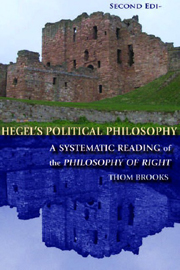2 - Property
Published online by Cambridge University Press: 12 September 2012
Summary
Introduction
Hegel's views on property are one of the most misunderstood aspects of his thought. We can best correct these misunderstandings only by interpreting his comments on property in full light of their place in the Philosophy of Right and the place of the Philosophy of Right within Hegel's larger philosophical system.
Hegel's Philosophy of Right is divided into three parts, each related to one another dialectically. These parts are ‘abstract right [abstrakte Recht]’ (PR, §§34–104), ‘morality [Moralität]’ (PR, §§105–41), and ‘ethical life [Sittlichkeit]’ (PR, §§142–360). Most commentators have restricted their analyses of Hegel's theory of property primarily to the section abstract right in his Philosophy of Right. Others have mistaken Hegel's views on property in abstract right as a theory of private law.
Few substantively appreciate that Hegel offers an extended view of property built around very different concerns in his later discussion of ‘civil society [die bürgerliche Gesellschaft]’ contained in the final part of the Philosophy of Right, ‘ethical life’. Perhaps more importantly, it has gone relatively unnoticed how Hegel's discussion of the free will in ‘Subjective Spirit’ found in his larger philosophical system (ES, §§440–82) relates to his discussion of the free will in ‘Objective Spirit’ immediately following (ES, §§483–552). This is important for an interpretation of the Philosophy of Right given that this text is an elaboration of ‘Objective Spirit’.
- Type
- Chapter
- Information
- Hegel's Political PhilosophyA Systematic Reading of the Philosophy of Right, pp. 29 - 38Publisher: Edinburgh University PressPrint publication year: 2009



